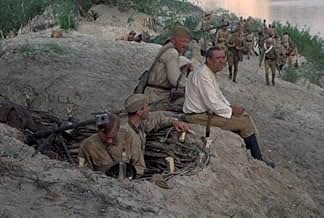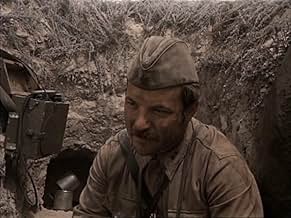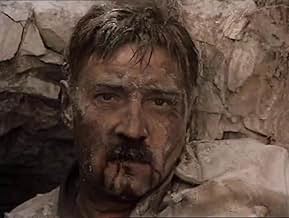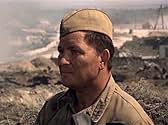CALIFICACIÓN DE IMDb
7.7/10
3.5 k
TU CALIFICACIÓN
Las tropas rusas prometen evitar que el ejército alemán tome Stalingrado.Las tropas rusas prometen evitar que el ejército alemán tome Stalingrado.Las tropas rusas prometen evitar que el ejército alemán tome Stalingrado.
- Dirección
- Guionistas
- Elenco
- Premios
- 3 nominaciones en total
Lidiya Fedoseeva-Shukshina
- Glikeriya
- (as Lidiya Fedoseeva)
- Dirección
- Guionistas
- Todo el elenco y el equipo
- Producción, taquilla y más en IMDbPro
Opiniones destacadas
In July 1942, in the Second World War, the rearguard of the Russian army protects the bridgehead of the Don River against the German army while the retreating Russian troops cross the bridge heading to Stanlingrad. While they move back to the Russian territory through the countryside, the soldiers show their companionship, sentiments, fears and heroism to defend their motherland Russian.
"Oni Srazhalis za Rodinu" a.k.a. "They Fought for Their Country" is a realistic war movie, with action and drama very well balanced. The greatest flaw in the screenplay is the usual exaggerated propaganda of the heroism of the soldiers, but it is nothing offensive to the viewer. This film has not been released in Brazil on VHS or DVD and I watched an unofficial DVD that skips the subtitles for long periods and consequently many dialogs are lost. My vote is eight.
Title (Brazil): "Eles Lutam por Sua Pátria" ("They Fight for their Motherland")
"Oni Srazhalis za Rodinu" a.k.a. "They Fought for Their Country" is a realistic war movie, with action and drama very well balanced. The greatest flaw in the screenplay is the usual exaggerated propaganda of the heroism of the soldiers, but it is nothing offensive to the viewer. This film has not been released in Brazil on VHS or DVD and I watched an unofficial DVD that skips the subtitles for long periods and consequently many dialogs are lost. My vote is eight.
Title (Brazil): "Eles Lutam por Sua Pátria" ("They Fight for their Motherland")
Its 1942. The war in Russia is going badly for the Russians. They are being slowly pushed back by the ever advancing Nazis. This is the story of a regiment who's slowly dwindling numbers try to survive and remain optimistic as they continue to try to prevent the enemy from ever reaching Stalingrad.
This is a great war movie. As with all Sergei Bondarchuk films this is a movie that makes you think and feel by showing you what its like to be a lone man in a huge situation. We get to go inside the heads of the various characters and we see what its like to be in battle. The battle scenes are good as the Russian soldiers simply try to survive the strafing, the bombing and to keep the Germans far enough away that they don't have a good chance at killing them.
In someways this film reminded me of Terrence Malicks's Thin Red Line which used similar techniques at times (for example: subjective camera, manipulation of the soundtrack, disjointed flashback.) Actually this movie reminded me of several other war films produced after its release and I'm curious if film makers like Francis Ford Coppola and others studied copies of this all but impossible to see film when they made things like Apocalypse Now.
As good as the film is it isn't perfect. The film can come off as a bit too "rah rah" for mother Russia at times, even though the film ultimately speaks to the larger question of defending one's own home land. The film also is a bit unfocused in the second half as the film takes some odd turns; then again the second half has some of its most powerful imagery with the young nurse trying to save the wounded man in the bomb crater and the return of one soldier from hospital.
See this movie. Its a great great war war film which only suffers when compared to some of the gems in the Sergei Bondarchuk back catalog of films.
This is a great war movie. As with all Sergei Bondarchuk films this is a movie that makes you think and feel by showing you what its like to be a lone man in a huge situation. We get to go inside the heads of the various characters and we see what its like to be in battle. The battle scenes are good as the Russian soldiers simply try to survive the strafing, the bombing and to keep the Germans far enough away that they don't have a good chance at killing them.
In someways this film reminded me of Terrence Malicks's Thin Red Line which used similar techniques at times (for example: subjective camera, manipulation of the soundtrack, disjointed flashback.) Actually this movie reminded me of several other war films produced after its release and I'm curious if film makers like Francis Ford Coppola and others studied copies of this all but impossible to see film when they made things like Apocalypse Now.
As good as the film is it isn't perfect. The film can come off as a bit too "rah rah" for mother Russia at times, even though the film ultimately speaks to the larger question of defending one's own home land. The film also is a bit unfocused in the second half as the film takes some odd turns; then again the second half has some of its most powerful imagery with the young nurse trying to save the wounded man in the bomb crater and the return of one soldier from hospital.
See this movie. Its a great great war war film which only suffers when compared to some of the gems in the Sergei Bondarchuk back catalog of films.
An excellent WW2 movie set on the Eastern Front near the Don River. Very authentic with lots of action. Kind of an epic scale of bravery at a period in the war when Germany seemed unbeatable. Stalingrad is raging at this time. This battalion is a rear guard as the others retreat across the Don River. The english subtitles are kind of poor. A man speaks and nothing or the dialogue is there but early or late for the scene. Its still a fine movie.
A major war movie, with an intimate sight on a Soviet regiment that is fighting back invading Nazi troops while retreating. Another interesting issue that is portrayed here are their relations with local peasant people, whose feelings towards retreat are well explored by the script too. Anyway, the greatest merit of this film are the war scenes, very well done, quite realistic.
10richard6
They fought For Their Motherland is a screen adoption of the prize winning novel by Mikhail Sholokhovis and is directed by proclaimed Russian director Sergi Bondarchuk. It was nominated for the prestigious palme d'Or at Cannes film festival in 1975; which illustrate how powerful the film is. Approval for the film adoption of the Great Patriotic War came from the Russian Ministry of Defence via the Russian cinema council.
The film concentrates on a small number of individual regimental soldiers fighting within a larger battalion on the Russian Steppes in 1942. We are shown not noble soldiers and distinguished officers of the "glorious" Red Army, but ordinary fighting men. They are hungry, dirty, mentally and physically drained. Also, they are exhausted by their continuous 12 months retreat eastwards towards the river Donn and eventually Stalingrad. The soldiers find harmony in talking about home, family and express their emotions and feeling on the war and what it as done to them as people and their motherland. Location is presented impressively on film; firstly, by using wide angel lenses to capture the vast midst of the Steppe salt marches and corn fields. Secondly, by using close angel lenses to photograph the soldiers as they pass through, rest and interact with nervous civilians in the inhabited dwellings. With a large budget comes large battle scenes. The film shows the merciless destruction of land and villages by Luftwaffe air strikes. Defensive formations containing a whole battalion which is broad in scale and includes large battle formation shoots. The film doesn't over exaggerate when handling the destruction, human cost and horror of battle in its scenes.
The main depiction of war, battle and destruction are powerfully focused on individual soldiers. This film tells a similar story for many veteran soldiers of the second world war, whatever the nationality. Boredom, fatigue, fear, fun, friendship, enemies, orders, pain, loss, distress, death and a longing to go home.
They Fought For Their Motherland" tours the inferno imposed upon the soviet people, both military and civilian, on one side by the advancing, all concurring, disciplined German army. And on the other by years of hardship, personal sacrifice, poverty and living to the ideologist view of the soviet dictatorship. This is not the most graphic of war films in todays standard of brutal, realistic, fast passed combat movies. There are scenes of battle sustained injuries and death. However, this film focuses the humanity of war and what it does to the land, and the opinions of people in occupied nations towards the soldiers who are there to protect them. This is a patriotic film from a Russian point of view, which for many years, as at the time of release, future Russian generations, and other nations that fought in the red army, should look back with pride and honour towards those who fought, and died, for their motherland.
The film concentrates on a small number of individual regimental soldiers fighting within a larger battalion on the Russian Steppes in 1942. We are shown not noble soldiers and distinguished officers of the "glorious" Red Army, but ordinary fighting men. They are hungry, dirty, mentally and physically drained. Also, they are exhausted by their continuous 12 months retreat eastwards towards the river Donn and eventually Stalingrad. The soldiers find harmony in talking about home, family and express their emotions and feeling on the war and what it as done to them as people and their motherland. Location is presented impressively on film; firstly, by using wide angel lenses to capture the vast midst of the Steppe salt marches and corn fields. Secondly, by using close angel lenses to photograph the soldiers as they pass through, rest and interact with nervous civilians in the inhabited dwellings. With a large budget comes large battle scenes. The film shows the merciless destruction of land and villages by Luftwaffe air strikes. Defensive formations containing a whole battalion which is broad in scale and includes large battle formation shoots. The film doesn't over exaggerate when handling the destruction, human cost and horror of battle in its scenes.
The main depiction of war, battle and destruction are powerfully focused on individual soldiers. This film tells a similar story for many veteran soldiers of the second world war, whatever the nationality. Boredom, fatigue, fear, fun, friendship, enemies, orders, pain, loss, distress, death and a longing to go home.
They Fought For Their Motherland" tours the inferno imposed upon the soviet people, both military and civilian, on one side by the advancing, all concurring, disciplined German army. And on the other by years of hardship, personal sacrifice, poverty and living to the ideologist view of the soviet dictatorship. This is not the most graphic of war films in todays standard of brutal, realistic, fast passed combat movies. There are scenes of battle sustained injuries and death. However, this film focuses the humanity of war and what it does to the land, and the opinions of people in occupied nations towards the soldiers who are there to protect them. This is a patriotic film from a Russian point of view, which for many years, as at the time of release, future Russian generations, and other nations that fought in the red army, should look back with pride and honour towards those who fought, and died, for their motherland.
¿Sabías que…?
- TriviaThis was the last film of Vasiliy Shukshin.
- ErroresDuring the first battle, a few of the Germans are carrying MP44 (or STG 44) assault rifles. This film takes place in summer 1942 and those rifles were not in service in the German army (even as prototypes) until over two years later.
- Citas
Ivan Zvyagintsev: May our love towards our country live in our hearts as long as we live.
Ivan Zvyagintsev: May our hatred to enemy always shine on the tips of our bayonets...
- ConexionesFeatured in Sergey Bondarchuk (1982)
Selecciones populares
Inicia sesión para calificar y agrega a la lista de videos para obtener recomendaciones personalizadas
- How long is They Fought for Their Country?Con tecnología de Alexa
Detalles
Contribuir a esta página
Sugiere una edición o agrega el contenido que falta

























